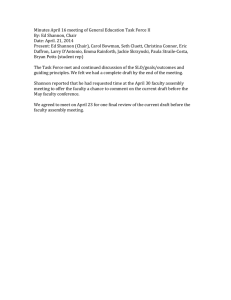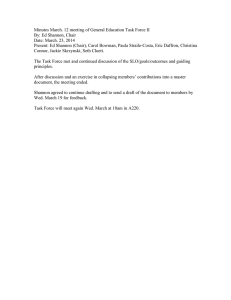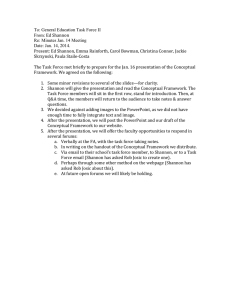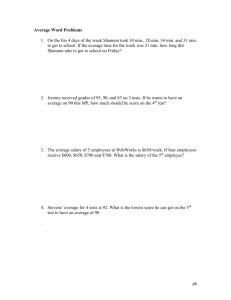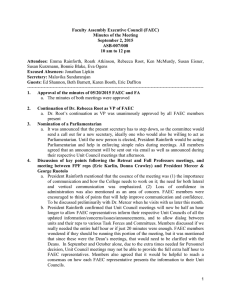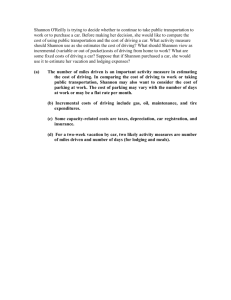Faculty Assembly Executive Council Meeting Minutes February 4, 2015 ASB-230 900-1100AM
advertisement
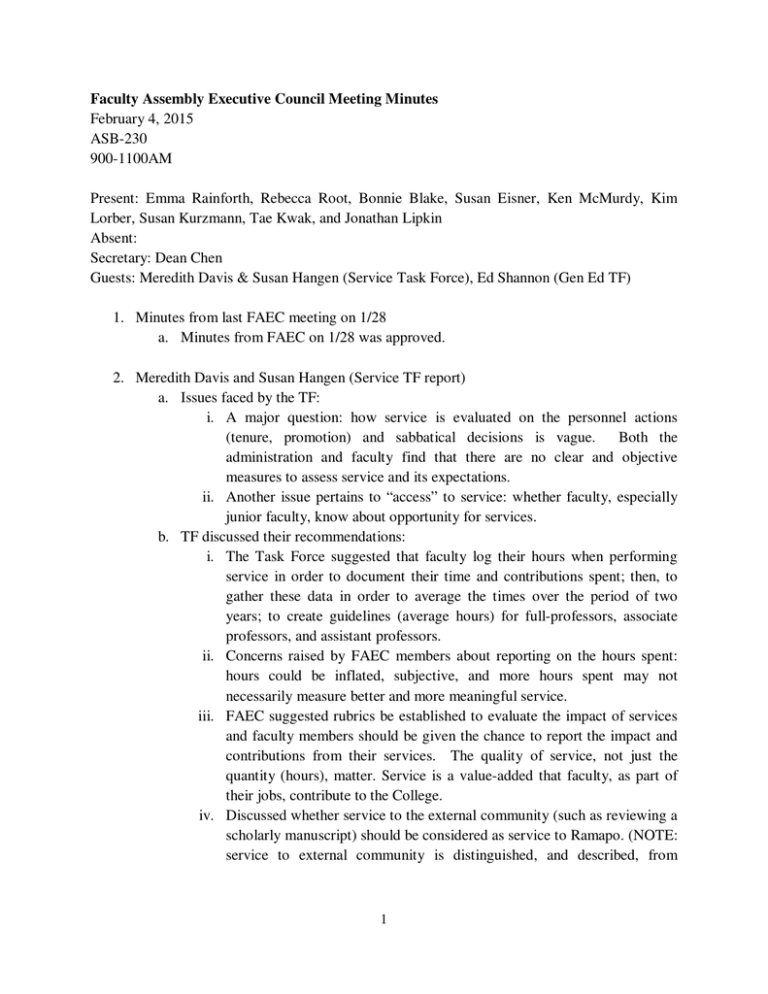
Faculty Assembly Executive Council Meeting Minutes February 4, 2015 ASB-230 900-1100AM Present: Emma Rainforth, Rebecca Root, Bonnie Blake, Susan Eisner, Ken McMurdy, Kim Lorber, Susan Kurzmann, Tae Kwak, and Jonathan Lipkin Absent: Secretary: Dean Chen Guests: Meredith Davis & Susan Hangen (Service Task Force), Ed Shannon (Gen Ed TF) 1. Minutes from last FAEC meeting on 1/28 a. Minutes from FAEC on 1/28 was approved. 2. Meredith Davis and Susan Hangen (Service TF report) a. Issues faced by the TF: i. A major question: how service is evaluated on the personnel actions (tenure, promotion) and sabbatical decisions is vague. Both the administration and faculty find that there are no clear and objective measures to assess service and its expectations. ii. Another issue pertains to “access” to service: whether faculty, especially junior faculty, know about opportunity for services. b. TF discussed their recommendations: i. The Task Force suggested that faculty log their hours when performing service in order to document their time and contributions spent; then, to gather these data in order to average the times over the period of two years; to create guidelines (average hours) for full-professors, associate professors, and assistant professors. ii. Concerns raised by FAEC members about reporting on the hours spent: hours could be inflated, subjective, and more hours spent may not necessarily measure better and more meaningful service. iii. FAEC suggested rubrics be established to evaluate the impact of services and faculty members should be given the chance to report the impact and contributions from their services. The quality of service, not just the quantity (hours), matter. Service is a value-added that faculty, as part of their jobs, contribute to the College. iv. Discussed whether service to the external community (such as reviewing a scholarly manuscript) should be considered as service to Ramapo. (NOTE: service to external community is distinguished, and described, from 1 v. vi. vii. viii. ix. x. service to College in the Handbook, and only service to College is required). Discussed whether service (to be documented) should be limited to those that are non-compensated (compensations in the forms of stipends and course-reassignments/releases); and whether attending meetings (i.e., convening groups, unit council, FA) would qualify as service or simply professional responsibility. President Rainforth stated that she viewed meeting attendance as participating in shared governance, and that a case could be made for viewing meeting attendance as service to the college. Discussed the timeline and infrastructure/mechanism for implementing the Service Task Force recommendation. FAEC suggested clarifying the purpose(s) of the report, distinguishing between “faculty’s use of time” (which administrators may be interested in) vs. “impact of service contributions” (e.g. how this information would be used in personnel decisions). FAEC also suggested clarification of how many hours faculty are being compensated for providing service; hours beyond that may be noted differently, and hours below that may be outliers of note. FAEC stated that Career Development needed to be listed as one of the personnel processes listed in the report. The Task Force will revise their report and recommendations based on some of the suggestions and discussions at FAEC. 3. Meeting with Ed Shannon (Gen-Ed Task Force) a. Gen-Ed Structure Survey regarding the Gen-Ed Structure Proposal (Ramapo Arch/Keystone Course Goals and Outcomes) was sent out to faculty yesterday. b. Ed Shannon asked all faculty to respond to the survey after reviewing the proposal (2/10 is the deadline). c. FAEC queried whether the Gen-Ed TF is in sync with other TFs such as the TFAEE. Ed responded yes, that the Gen-Ed proposal is drafted based on a 4credits model; he noted it can be adapted though as needed. FAEC also asked whether the proposed model was constructed having benchmarked other Gen Ed programs and, specifically, if Middle States would find the proposed model valid. Ed responded yes, and said Eric Daffron has been present throughout TF deliberations. d. Discussed the Arch components: Keystone courses, mid-career reflection, cluster/minor, experiential learning. e. Discussed the elements of the structure in terms of required courses and categories (currently the upper-level Topics, International Intercultural), and how they align with the proposed new structure. 2 f. Ed Shannon suggested that a finalized proposal should be ready by the end of Spring semester. He will double-check the dates (given that the FA President’s understanding was that implementation was to be for Fall 2016). 4. IRAC: IRAC invited FAEC to provide additional faculty presence; so FAEC needs to identify a second faculty member to serve, to liaise with FAEC. FAEC thought that this rep should have experience with study abroad / international travel with students. FAEC reps will solicit at Unit Council. 5. FA agenda for 2/18 (tentative): Service TF report (provided revision received); Gen Ed plan (updates from Ed Shannon); TFAEE (updates provided by Eric Karlin). 6. Discussed the interim schedule for 2015-16: faculty seem to be in favor of the 4 credits, but believe that the scheduling could be improved, including the distribution of the courses and time blocks (padding of course times with unnecessary breaks elongating the day), impact on night class offerings given impact on adjunct availability, and proportion of 3x a week vs. 2x a week courses). Unit Councils have requested that Academic Affairs provided pedagogical research (documentation –the literature) supporting the Interim Schedule in those respects. FAEC will ask Provost for rationale (documentation – the literature) including that for 3 day a week classes. 7. FAEC discussed mechanisms for assessing the Interim schedule upon its implementation; it will consult with TFAEE on whether a new task force will be needed, answerable to the FAEC and FA, to assess the interim schedule after it is implemented in 2015-16. If we go in this direction, FAEC members will start planning for rubrics to evaluate the schedule. 3
